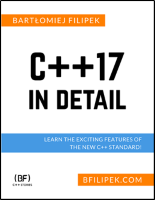CopperSpice: Thread Safety
New video on the CopperSpice YouTube Channel:
Thread Safety
by Barbara Geller and Ansel Sermersheim
About the video:
This video covers concepts like thread safety, conditional thread safety, and reentrancy. We discuss the differences between these terms, the vital role that documentation plays in designing thread safe code, and how to effectively and clearly communicate the level of thread safety a particular function provides.
Please take a look and remember to subscribe!


 Have you registered for CppCon 2018 in September?
Have you registered for CppCon 2018 in September?  ACCU’s Overload journal of August 2018 is out. It contains the following C++ related articles.
ACCU’s Overload journal of August 2018 is out. It contains the following C++ related articles.
 Have you registered for CppCon 2018 in September?
Have you registered for CppCon 2018 in September?